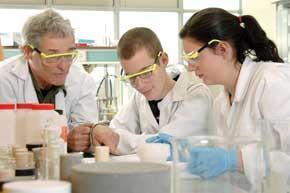Training and funding is available to chemists and related scientists who want to encourage future generations to follow in their footsteps.
Training and funding is available to chemists and related scientists who want to encourage future generations to follow in their footsteps.
If you’re interested in using your professional skills to guide young people as they consider future career options, the organisation Scimitar Europe (Science Mentoring International Training Around Europe) has been set up to provide the grounding you need. The scheme’s partners in the UK, Sweden, Finland, and Italy hope to raise the aspirations of young people, and demonstrate the value of studying science, technology, engineering and mathematics (Stem) subjects.
The EU-funded project, launched in December 2008 following a successful trial in the four countries, is led by educational charity Surrey Satro (Science and technology regional organisation). ’Engaging young people in Stem subjects is a fundamental part of what Surrey Satro is all about’ says CEO, Beccy Bowden. ’Mentoring schemes encourage young people to achieve their full potential, and also equip them with life skills along the way, such as communication, team working and entrepreneurship.’

Bowden describes a typical example of mentoring, in which a group of 6th form students doing projects in stem cell technology could be paired with a researcher in that field who works in the local area. As well as giving the students’ projects input from the cutting edge of research, the mentor can provide insight into what it is like to follow a career in science.
One of the first mentors to be trained by Scimitar, who chose to remain anonymous, is an experienced project manager and chemical engineer at BOC’s engineering department in Guildford. He says the scheme would equally suit professionals at the beginning of their careers. This pioneering mentor has offered two lunchtime meetings a month to two local schools, and expects the network to develop gradually. His experience so far suggests that the programme provides clear benefits to mentors and mentees alike.
In Sweden, the programme’s partner Transfer has trained 18 mentors. Their work culminated in a ’Young Stars’ Day’ at which mentors and mentees were awarded diplomas. Scimitar Europe has worked very well for mentees and mentors in Sweden, says secretary general Eva Von Krusenstierna: ’[We] will definitely use it again this year.’ EU backing has helped promote the scheme to schools and companies, says Von Krusenstierna, who have shown ’great interest’ so far.
It’s not only students who can benefit from the scheme. In Kent, teachers are getting in on the act too. Education Business Partnership (EBP) Kent recognised that while a mentor can work with a handful of students, a teacher can reach 150 students.
So EBP Kent is matching local teachers with Scimitar-trained ’buddies’. The pairing can meet to discuss the latest developments in the buddy’s profession. This helps keep the teacher informed as to how their subject is applied, and their new-found knowledge can be passed on to their students.
’However good they are as a teacher, they probably have not seen application of the subject in the workplace,’ says Anne McNulty, executive director of EBP Kent. This feeds back to the students, she says: ’Some students won’t pick a subject like science or maths because they don’t know where it will go.’ But the mentoring scheme helps to take Stem subjects beyond the abstract and capture students’ imaginations.
One Kent school’s science department has already recruited 18 buddies, forming partnerships which are to last at least a year. Chemical scientists from environmental, medical, analytical and even brewing businesses are among these mentors.
The training is accredited by the Open College Network south-east region (OCNSER), so participation counts towards a mentor’s personal career development. Bowden says that electronics company Siemens are adopting the scheme as part of their graduate training.
Bowden also believes Scimitar Europe can help participating companies with recruitment issues. ’There’s been a concern for a long time that there are insufficient Stem graduates and school students. Mentoring is a means of bridging that gap.’
Participating companies also have the opportunity to improve their relations with their local communities, as they visibly invest in the future of local young people. ’Our company feels very much linked in, rooted in the community. Education is a major concern of everyone in the area,’ says Simon Napper, communications officer at BOC. ’Of course, many of our employees are parents themselves.’
Interested employers should call Beccy Bowden, CEO at Surrey Satro, on 01483 226 322. If you want to become an individual mentor or are already a mentor and want Stem registration and training, please contact Surrey Satro for further details.
Tom Westgate is a freelance science writer based in Manchester, UK.












No comments yet